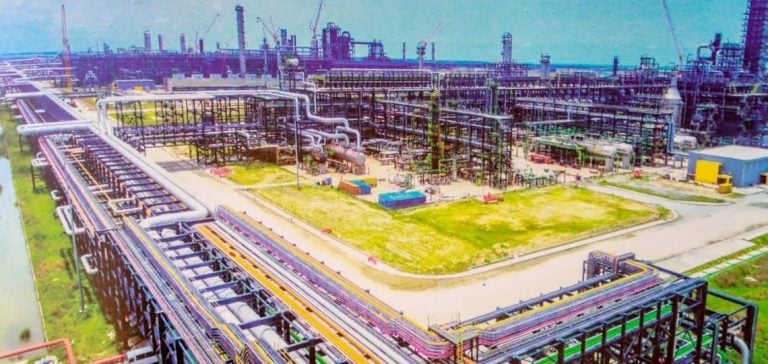Gasoline shipments to Nigeria have seen a significant decline in the first two weeks of October, according to ship tracking data from S&P Global Commodity Insights. This drop coincides with the arrival of domestic supply from the Lagos-based Dangote refinery, which appears to have reduced the appetite for exports.
However, with the new 650,000 b/d refinery operating at around half its capacity and the key gasoline-producing unit, the RFCC (Residue Fluid Catalytic Cracking), remaining unstable as it ramps up, traders have warned that Nigeria could still face a substantial fuel deficit in the absence of imported supply.
A Significant Decline in Exports
According to S&P Global Commodities at Sea data, just 280,400 barrels of gasoline and blendstock were dispatched to Nigeria in the first week of the month, ending Oct. 6, via one MR, down from a weekly average of 1.3 million barrels in August. In the week ending Oct. 13, only one product tanker reported shipping gasoline to Nigeria, with just 290,567 barrels departing from Antwerp for delivery to Lagos. These two October cargoes fall significantly lower than the 12 dispatched in the first half of August and September respectively.
Since Oct. 8, no gasoline has been reported shipped to Nigeria. This slump in export activity signals the first disruption to a previously well-established flow, mostly from Northwest Europe to West Africa, with the arrival of its own domestic refining capacity.
Reduced Dependence and Risk of Deficit
Without its own domestic supply chains, Nigeria – Africa’s largest demand hub – has typically imported around 200,000-300,000 b/d of gasoline to service the bulk of its fuel supply, creating a dependency that Africa’s richest man, Aliko Dangote, sought to overhaul with the inauguration of his new refinery in January.
In September, the refinery reached the key milestone of producing its first gasoline supplies from its reformer, followed by its higher-yield RFCC, which continues to be ramped up. Sources at the refinery have said that Nigeria’s state oil company, NNPC (Nigerian National Petroleum Corporation), has so far been its sole buyer of gasoline, having taken delivery of 90 million liters (around 570,000 barrels) from the refinery.
Outlook and Future Challenges
Yet, with shipments to Lagos appearing to preemptively decline, traders have flagged a potential shortfall in availability as domestic production remains insufficient to service consumption of over 300,000 b/d.
“There is no schedule for gasoline coming from Europe to Nigeria at the moment,” one trade source said, speculating that the new refinery might meet at most a quarter of domestic demand.
“The rest will have to come from whatever is in the Offshore Lome market,” the trader added, citing recently heard values of $35-$40/mt above Platts 10 ppm barges.
Impact on the Global Market
Meanwhile, lower arbitrage appetite from Northwest Europe has led to decreased buying activity for FOB AR 10 ppm barges in the Platts Market on Close assessment process, sources said.
Dangote Supply Channels
When the refinery permanently displaces previous gasoline flows will depend on the smooth ramp-up of its operations and delivery of material to the domestic market.
Sources at the refinery said that a contract remains in place with NNPC to act as the sole buyer for its gasoline supply, despite an announcement from the country’s finance minister, Wale Edun, that Nigerian marketers are now free to buy directly from the refinery.
An executive at the refinery said that the plant’s RFCC, set to unlock higher gasoline production volumes, could be stabilized by Nov. 11, although Commodity Insights analysts have forecast that the unit will only be contributing higher supplies from February 2025.
A faster-than-expected ramp-up would accelerate pressure on global gasoline cracks in the Atlantic Basin to as early as first-quarter 2025, though as a very large single-train refinery, the plant remains exposed to outages and disruptions.
Commodity Insights anticipates that the refinery will displace around 260,000 b/d of gasoline flows from Europe to West Africa by 2026, while sweet hydrocracking margins are seen as unlikely to recover substantially from an expected average of minus $1.50/b through Q4 2024 in Q1 2025.






















